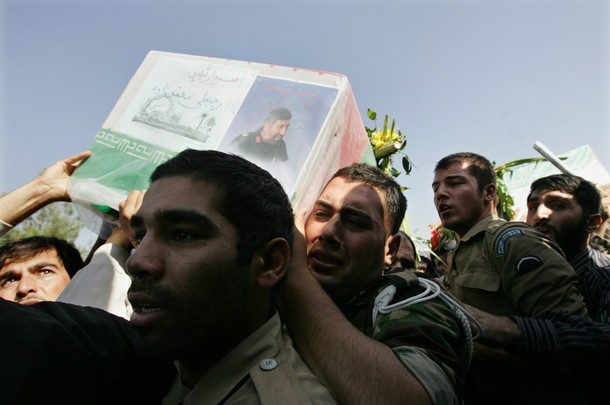
The terrorist attacks on October 18 killing dozens of Revolutionary Guardsmen, including seven top commanders, and several tribal leaders in Southeastern Iran are the latest episode of a three-fold challenge to the Regime. These attacks were followed two days later by the shooting of two Iranian police officers in Iranshahr in the same Sistan-Baluchistan province. The Iranian government has to cope not just with the revival of the minorities’ issue, but also with the international community’s pressures and with tensions within the elites that are preventing the Regime from reconsolidating its pre-June 12 election day legitimacy.
What about the possibility of any governmental retaliation against the Baluchi minority? The Revolutionary Guard underestimated the threat coming from Jundallah, a Baluchi Sunni group that has been responsible for several attacks against the Government and against Shia. While some Iranian Regime figures, including the leader of the Revolutionary Guard, are calling for retaliation against the US, UK and even Pakistan, a neighboring country with which Iran has had good relations for decades, an escalation by the Shia government against the Sunni Baluch would be unwise.
The border between Iran and Pakistan where the attack took place is very porous, and some Al Qaeda members or Taliban could easily become provoked to come over to join their oppressed Jundallah brothers. At this time, the Jundallah movement seems to be ‘homegrown’ and Teheran’s accusations of Pakistani involvement in Sunday’s attacks are easy to dismiss. Ironically, Teheran is accusing the Pakistan Army secret services (ISI) of supporting Jundallah, when in fact, Jundallah’s natural allies, Al Qaeda and the Taliban, are under attack by the Pakistan Army in nearby South Waziristan.
It is also easy to dismiss Regime accusations of United States and United Kingdom involvement in Jundallah’s activities, or in general with minorities in Iran. The tensions are a result of decades of mistreatment and underdevelopment. The Kurds, Turks, Arabs, Baluchis and others have been on the short end of the stick in terms of funds for education, health care, jobs and any government largesse. Let’s not forget as well that the Islamic Republic of Iran’s record on human rights, including the rights of minorities is dreadful.
What is most surprising is the failure of Iranian security services to protect leaders of the national and provincial Revolutionary Guard, who were struck down during Sunday’s attacks. Could this be an inside job, given the amount of information available following the purge in the Intelligence Ministry of over 10,000 workers considered unreliably loyal to the Regime?
Terrorism among minorities is only one of the problems the Regime faces from the people of Iran. The Green Movement in the streets of Teheran and other urban areas can erupt again at any moment, most likely, on the 30th anniversary of the takeover of the US Embassy on November 4th. Just as Al Quds or Jerusalem Day on September 18th was an excuse for the reformists to take to the streets against the Regime (with slogans attacking the Supreme Leader himself), the Regime is likely to encounter further street demonstrations and even workers strikes at any time. The Regime simply is not in control over the protest movement even if the balance of forces overwhelmingly favors the Regime.
While the Regime battles its minorities and urban demonstrators, it has to contend with two other issues: Rafsanjani, Mousavi, Karroubi, Khatami and other reformist or neo-reformist leaders refuse to buckle under President Ahmadinejad’s rule. Just as importantly, Ahmadinejad is having difficulty getting even the hard liners among Iranian ruling elites to support his appointments. At the same time, Ahmadinejad’s government is battling the international community, which is starting to coalesce on sanctions. It is hard to imagine the Regime being able to fight on all three fronts: the people, the elites and the international community, at the same time. Something has to give.
Jonathan Paris is a London-based Nonresident Senior Fellow with the Atlantic Council’s South Asia Center. Photo: Getty Images.
Image: jundallah-attacks-coffin.jpg
